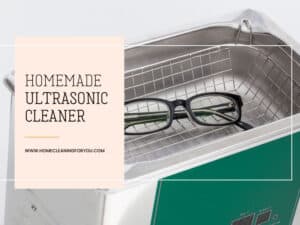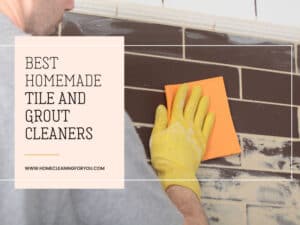Homemade Screen Cleaners That Everyone Can Make

Homemade screen cleaners are a great choice for most of the screens, from electronic devices to window screens, pool screens, and shower screens. As you soon find out in my article, there are various treatments for every type of screen to achieve the ultimate result.
Imagine that one day you sit down at the table and totally freak out when looking at the screen full of dust and on the window screens, but you can’t find any cleaning product in your house. Don’t panic because you can prepare a DIY screen cleaner in less than 5 minutes.
Rest assured that my following methods are suitable for TVs, LED, LCD, laptops, iPhone, iPad screens, and more, so take time to go through all of them and choose the right one for you.
Powerful DIY Electronic Screen Cleaners You Must Know ASAP
Homemade screen cleaners are affordable, convenient, and, more importantly, super effective. They are free of chemicals and unknown substances, so they’re safe for you and your family.
In addition, all ingredients are easy to find and quick to assemble, which definitely saves you a lot of time and energy.
Let’s start!
For Various Types Of Screens
These solutions I mention below can be used for many devices, so keep them handy and clean your screens whenever you want.
Option 1: Isopropyl Alcohol/Distilled Vinegar

Distilled vinegar and isopropyl alcohol are considered versatile cleaners that you can apply to all screens. You know what? The combination of dishwashing liquid with distilled vinegar can create an effective solution for getting rid of makeup stains on your carpet. It’s highly recommended that you keep distilled vinegar handy in the house.
You can apply these cleaning solutions once or twice a week. My advice is that you shouldn’t wait until they’re too dirty to start.
What You’ll Need
- Vinegar or isopropyl alcohol 70%
- Microfiber cloth
- Distilled water
- A spray bottle
Step 1: Apply The Cleaning Solution
Pour ½ cup of vinegar or isopropyl alcohol and ½ cup of water into a spray bottle.Mix well before spraying it on the microfiber cloth.
Step 2: Wipe The Screen
Wipe the screen with the cloth a few times to restore its shine. Don’t forget to clean corner areas. After use, close the lid tightly to stop isopropyl alcohol from evaporating.
Keep in mind that plain vinegar can smell a bit too much for some people, and it also takes longer to dry than isopropyl alcohol.
Whatever option you’re going to use, don’t forget to put a name on the bottle to avoid any mix-ups.
Some products with oleophobic-coating screens might not be suitable for alcohol which is often stated clearly on their care labels. In these cases, use distilled water only or an alcohol-water mixture for hard-to-treat marks.
Let’s make this simple yet effective DIY screen cleaner now!
Option 2: Plain Vinegar

What is sticking to your TV screens when you look closely at them? My guess is dust and many unknown nasty particles. Some people might suggest fly poop as a number one thing I totally relate to.
Usually, a microfiber cloth can do wonders to your screens, but if you prefer deep cleaning, you might want to pick up a jar of white vinegar. This cleaning powerhouse is fantastic, and it can lift tide pod streaks from clothes easily. Vinegar is often diluted with water to avoid damaging smooth surfaces (1).
Besides eliminating dirt, it can disinfect your screens effectively.
What You’ll Need
- White vinegar
- Distilled water
- Microfiber cloth
- A spray bottle/ a glass jar
Step 1: Prepare The Screens
Turn off and unplug your computer and TV screen.
Step 2: Mix The Vinegar Solution
Combine 1 part of vinegar with 1 part of water to form a powerful cleaning solution for your TV screens in a spray bottle or a glass jar.Shake well until they are mixed thoroughly.
Step 3: Wipe The Screen
Spray the mixture onto the microfiber cloth or dip the microfiber in the glass jar.Gently wipe the surface with a damp cloth. You might need to wipe a few times before getting the expected result.`
Let’s learn how to clean your 4K TVs the right way now!
iPhone Screen Cleaner
It’s pretty simple to deal with these screen types as long as you use the proper cleaning solution and equipment. Luckily, I have some tried-and-true suggestions which work amazingly every time I need them.

Remember to stay away from ammonia, window cleaners, compressed air, solvents, household cleaners, hydrogen peroxide-based cleaners, aerosol sprays. If you don’t want to destroy the oleophobic coating on screens, use isopropyl alcohol (2).
As you might know, Apple advises you to clean iPhones, iPads, and other devices with 70% isopropyl alcohol wipes. However, there might be a simpler method as below:
What You’ll Need
- Distilled water
- Microfiber cloths
Step 1: Prepare The Device
Turn off your device and unplug.
Step 2: Dampen The Cloth
Soak the microfiber cloth in water and wring out the excess water before using it for cleaning your screen. Make sure that it’s slightly damp, not wet.
Step 3: Wipe The Screen
Wipe the display part of your device slowly in a circular motion and tackle all corners of the device.Another dry cloth can remove any remaining dusty streaks.
Let’s explore the simple way to clean your iPhones!
Smartphone Screen Cleaner
Wanting a germ-free and streak-free smartphone screen? Keep a spray bottle of rubbing alcohol solution in your house and use it whenever you need it. It’s said that rubbing alcohol is also helpful when removing tree sap from your garments. Sounds amazing?
As I have mentioned earlier, rubbing alcohol can efficiently wipe dust and kill bacteria. And unlike tap water, distilled water in the solution tends to leave no streak on the screen.
The best part? Except for charging outlets and microphones, this solution can work wonders on most parts of the phone, including the case. It’s also suitable for TV remotes.

What You’ll Need
- Microfiber cloth
- Distilled water
- Lemon essential oil (optional)
- Rubbing alcohol
- A spray bottle
Step 1: Shutdown The Device
Turn off and unplug your smartphone before cleaning.
Step 2: Prepare A Cleaning Concoction
Add equal parts of water and rubbing alcohol into a spray bottle. Add some drops of lemon essential oil if you prefer.Close the lid tightly and give it a good shake.
Step 3: Start Cleaning Screens
Spritz the cleaning solution on the microfiber cloth and wipe gently to remove the dust from your screens. Repeat several times if needed. Be careful not to let moisture enter any openings. It would be best to clean twice a week or as needed.
Rubbing alcohol is also excellent for cleaning numerous items around your house.
For Stubborn Grime On Screens
For screens that haven’t been cleaned for quite a long time, they might have accumulated a lot of stubborn smudges. In this case, apply this cleaning mixture to get rid of these nasty and unsightly marks right away.
What You’ll Need
- Lime essential oil
- Distilled water
- White vinegar
- A spray bottle
- Dry soft cloth
Step 1: Prepare A Cleaning Mixture
Blend 5 drops of lime essential oil, 4 tablespoons of plain white vinegar, and 4 tablespoons of distilled water in a spray bottle. Shake well to combine all the ingredients.
Step 2: Dampen The Cloth And Clean The Screen
Spray a generous amount of this concoction on a soft dry cloth.Wipe the surface carefully to remove all the dust on it.

Pro Tips When Cleaning Electronic Screens At Home
Here are some great tips you should know as soon as possible to achieve shiny screens while keeping them safe.
Never Use Tap Water
It’s recommended that you shouldn’t use tap water to make homemade screen cleaners because it contains minerals that could stain or damage the screen. Therefore, distilled water is the number 1 choice when it comes to creating a screen cleaning solution.

Avoid Spraying The Mixture Directly On The Screen
Never mist directly onto the screen at all costs. The cleaning solution might drip into places on your devices and cause unwanted problems. Instead, spray on the cloth and use the damp cloth to wipe the screen.
Also, avoid cleaning charging outlets, microphones, or any opening areas to prevent liquid from getting inside the smartphone.

Don’t Use Paper Towels For Screens
You shouldn’t use paper towels to wipe the most delicate part of your devices as they are pretty rough and can easily make some visible scratches on the screen. Not to mention, they can leave tiny bits of paper all over your devices.
It’s highly recommended that you opt for a dry, soft microfiber cloth to clean the display. Bear in mind that you should use clean cloth only because used ones might contain hard particles, which can cause unexpected scratches.
To clean the corners of the screen, use a cotton swab instead of a cloth.

Remember To Unplug Your Devices Before Cleaning
As a rule of thumb, turn off and shut down your smartphones, laptops, computers, and TVs before carrying any cleaning steps. It’s a must to protect your electronic devices from being damaged.

Other Important Cleaning Tips
- Cleaning dust with a cloth should always be the first step.
- Bleach should be avoided in any circumstance.
- Spray the liquid on the cloth and keep it damp, not wet. Too much liquid can drip down to unwanted parts of your devices.
- Different screens require different cleaning methods, so make sure that you consult manufacturer guidelines for additional cleaning instructions, especially if you’re in doubt.
- Find the right chemicals for your screens. Avoid using methyl chloride, toluene, ethyl alcohol, ammonia, acetone, or ethyl acid. Windex and other glass cleaners are a big no-no.
- Don’t press or scrub the screen when cleaning. Instead, gently wipe in a circular motion to remove dirt.
- You might need to keep wiping several times to restore their shine.
- Schedule to clean twice a week or as needed.
- Feel free to store vinegar solution in a spray bottle for as long as you want. You can also clean black kitchen appliances with this mixture.
Natural Cleaners For Window Screens That Get Results
Who are you? Those who clean window screens periodically, for example, every Sunday, and those who delay this tedious chore until they can’t see anything outside through the window.
I guess if you’re reading this section, you might fall into the second category. So, wait no more, let’s find out how to clean them quickly and adequately.
Option 1: Baking Soda And Washing Soda
As you might not know, a natural cleaning solution made from baking soda and washing soda can break down debris in a straightforward way.
What You’ll Need:
- Water
- Baking soda
- Washing soda
- Lavender essential oil
- Spray bottles
Step 1: Prepare The Soda Solution
Combine baking soda and washing soda in a spray bottle at a 3:1 ratio (tablespoon). Add 2 cups of water and shake the bottle well to dissolve the mixture thoroughly.
Step 2: Prepare The Oil Solution
Grab another spray bottle, and fill it with 2 cups of water and 10 drops of lavender essential oil. Mix well.
Step 3: Apply The Cleaning Mixture
Spray the soda mixture all over the window screens. Let it stay for a while. Keep spraying oil solution on the screens.

Option 2: Dish Soap Or Vinegar
Both dish soap and vinegar can attack and loosen ground-in grimes, dirt, stains on the window screens in a wink. It’s highly recommended that you bring them outside or in the bathroom so that cleaning tasks will become more quick and effective.

What You’ll Need:
- Water
- Dish soap or vinegar
- A bucket
- A soft sponge
- A garden hose
- A handheld vacuum cleaner
Step 1: Prepare The The Window Screens
To make the cleaning process more accessible, it would be best if you could take them down and lay them outside. Mark them so that you don’t have any difficulty when reassembling.
Step 2: Mix The Solution
Add ½ gallon of water and ¼ cup of dish soap in a bucket. You can add ¼ cup of vinegar instead of dish soap.
Step 3: Wash The Window Screens
Dab the soapy mixture onto both sides of the window (keep them in the upright position if possible) and wipe them with a soft sponge. Use a water hose with the lowest pressure setting or the shower to flush any remaining soap solution.
Step 4: Air Dry The Window Screens
Let them dry outside and after that, use a handheld vacuum cleaner to remove any residue left on the screen if needed.
How to clean your windows effortlessly? Find out now!
Other Quick Solutions
Below are some quick and convenient solutions which you can utilize at home to clean window screens.
Lint Roller
If you plan to clean your window screens every week, you might need only a lint roller to help pick up dust and dirt on the surface of them. The smaller crevices are, the easier it is to work.

Vacuum
You had better use a vacuum cleaner with a soft bristle attachment to clean window screens once a month. This appliance also makes a practical first step before applying any cleaning steps, especially before smearing DIY cleaners on suede surfaces.
People say it’s the most straightforward way to remove loose grime, dust, and dirt and maintain the cleanliness of various surfaces. You can detach window screens and place them on a drop cloth for thorough cleaning.

Clean Magic Eraser
Besides the lint roller, another cleaning tool you can refer to is a Magic Eraser. First, you need to dampen the foam and gently scrub the screen. The best part? You don’t need to take down the window.

Toothbrush
Soak your window screen with a generous amount of soapy solution and use a toothbrush to scrape off tough stains. Remember not to scrub too hard; otherwise, you can damage the screens.

Pressure Washing
Pressure-washing window screens with a pressure washer in a low-intensity setting can be great for undetachable screens. Sometimes, you can use a garden hose instead.

Fantastic Homemade Pool Screen Cleaners

Here are step-by-step instructions so that you can gain some confidence when tackling such a large screen yourself.
What You’ll Need:
- A soft-bristled brush
- Warm water
- Vinegar
- A bucket
- A dish soap
- A garden hose
- A pressure washer
Step 1: Eliminate As Much Dirt As Possible
Use a soft-bristled brush to scrub off leaves, dust, loose grime, and debris on the enclosure screens.
Step 2: Remove The Stain
Flush the screen with a garden hose, then scrub it with a cleaning solution of dish soap and warm water. Rinse with a lot of water. Examine carefully for any missing spots on the screen.
Step 3: Eliminate Stubborn Marks
If you need a more profound cleaning method to get rid of hard-to-remove gunk, you can use a pressure washer. You should start with the gentlest pressure and raise gradually.
Step 4: Remove Mildew Or Algae
You need to mix 3 quarts of bleach and 1 gallon of water to eliminate mildew or algae. Use a long handle with a soft-bristled brush to scrub all problems.
Notes: I suggest that you mix an equal amount of white vinegar and warm water in a spray bottle and spray on the screen. Scrub to remove mold, moss, or mildew stains. This solution is safer for you, the pool screen, and the environment.
Step 4: Air-dry The Screen
If you use bleach, you need to rinse the screen with clean water to remove residue. After that, you can let it air-dry. For the vinegar solution, you can skip the rinsing moment.
Here’s how to clean your pool screen easily!
Homemade Cleaners For Shower Screens
As you might not know, shower screens are mostly made from plastic and various types of synthetic polymers. It can become murky and dirty with a lot of limescale buildups. Let’s explore some effective methods which genuinely help.
Option 1: Baking Soda And Vinegar
The winning combination of baking soda and vinegar can tackle many household stains from clothes as well as from screens. Give this simple concoction a try, and it won’t let you down.
What You’ll Need:
- Baking soda
- White vinegar
- A cloth
- A spray bottle
- Warm water
Step 1: Apply The Baking Soda
Soak the shower screen with a lot of water using a shower. Sprinkle baking soda on the cloth, apply it all over the screen, and scrub.
Step 2: Spray With Vinegar
Pour vinegar in a spray bottle and spray on the screen to wash away the baking soda. To finish, rinse with warm water.

Option 2: Lemon Juice And Salt
If your shower screens include metal frames, this method is for you. It helps you remove any buildup sticking to the frame.
What You’ll Need:
- Lemon juice
- Salt
- A toothbrush
- Warm water
Step 1: Prepare The Mixture
Combine 2 tablespoons of salt and 1 tablespoon of lemon juice.
Step 2: Clean The Shower Frame
Rub the mixture on the screen with a toothbrush and scrub the frame. Allow it to stay for several minutes, then rinse with a generous amount of water.

Option 3: Vinegar
In case you notice hard mineral deposits on the shower screens, feel free to use vinegar as follow:
What You’ll Need:
- Vinegar
- Paper towels
Step 1: Soak The Screen In Vinegar
Check if the screens are completely dry before you start cleaning. Cover the screens with vinegar-soaked paper towels. Add one more layer if needed to ensure all areas are soaked in vinegar.
Step 2: Wipe Clean
Allow it to sit for 45 minutes or several hours. Wipe off the mineral deposits.

Option 4: Dishwashing Detergent And Water
Do you know that the combination of water and dishwashing detergent can clean your shower screen? Let’s see.
What You’ll Need:
- Dishwashing detergent
- A cloth
Step 1: Apply Dishwashing Detergent And Scrub
Rub dishwashing detergent all over the dirty shower screen. Wipe the screen with a cloth. Try to scrub grimes away by moving in a circular motion. Dab more water if necessary.
Step 2: Rinse
Rinse with water to remove the soapy solution.
Do you know how to clean shower screens? Here’s a worth-looking answer.
FAQs
Do you have any questions related to homemade screen cleaners? Comment below so I know. Here are some common questions which might also appear in your mind. Let’s see.
Natural And Economical Ways For Shiny Screens At Home
I like most of the homemade screen cleaners I’ve listed above, thanks to their powerful cleaning properties and especially their simplicity.
You can apparently save some extra bucks in the long term when using these homemade screen cleaners, so give them a try.
Store-bought ones might be convenient, but you have to equip yourself with some chemical knowledge before deciding to buy a product. Wrong solutions can cause terrible problems to your screen.
What’s your favorite product? Is it straightforward? Is it safe? Share with me your thoughts so that you and I can discuss more in the comment section.








Samantha Lee
Head Cleaning Expert
Expertise
Professional Home Cleaning, Green Cleaning Techniques, Stain Removal & Fabric Care, DIY Home Maintenance & Organization, Sustainable Cleaning Products, Home Care for Busy Lifestyles
Education
University of Denver
Samantha Lee is the Head Cleaning Expert at HomeCleaningForYou.com, specializing in eco-friendly home care. She holds a Bachelor of Science in Environmental Science from the University of Denver, focusing on sustainable cleaning solutions.
With expertise in green cleaning, stain removal, and DIY home maintenance, she helps homeowners keep their spaces fresh and chemical-free. Samantha has been featured in lifestyle publications and has partnered with brands promoting natural cleaning products.
She also shares practical tips through her blog, online courses, and workshops. Passionate about sustainability, she enjoys testing new eco-friendly cleaning methods and spending time outdoors.